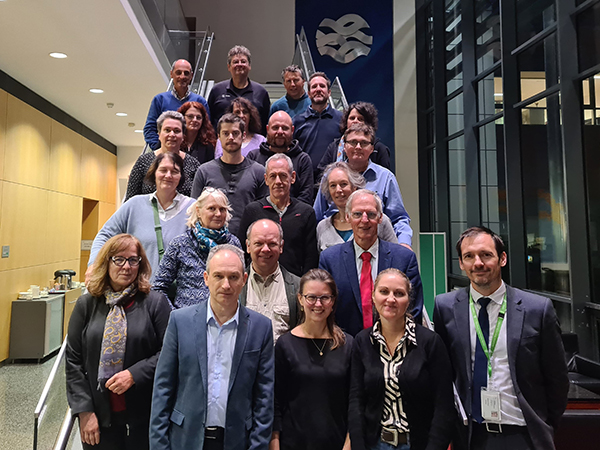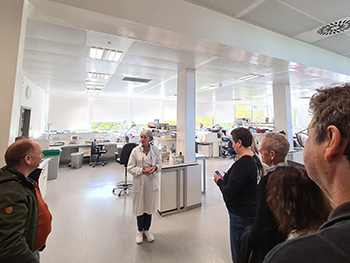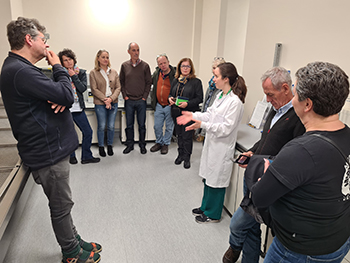
28th Meeting of the Panel on Quarantine Pests for Forestry
Kildare, Ireland, 2023-10/31-11/02
The EPPO Panel on Quarantine Pests for Forestry met on the 2023-10/31-11/02 in Kildare (Ireland). The scope of this Panel covers risk assessment and management to prevent the introduction and spread of quarantine pests of forest trees to support NPPOs in their work. The meeting was hosted by the Department of Agriculture, Food and Marine of the Government of Ireland.

The EPPO PRA on the Apple buprestid, Agrilus mali (Coleoptera: Buprestidae) was presented to the Panel for information and raised no specific questions. The DEFRA (GB) Rapid PRA on Phytophthora pluvialis was discussed to consider the need to produce a PRA report covering the whole EPPO region. The Panel concluded that an intensive climate analysis would be needed and that there are still some gaps in the knowledge, e.g. on the impact of the pest.
The Panel discussed inconsistencies identified between the EPPO Standards of PM 8 Series: Commodity-specific phytosanitary measures and related PRAs, with the aim to resolve the inconsistencies based on scientific evidence.
The Panel also discussed the Survey distributed earlier among the EPPO member countries on the usage of these Standards in the practical work of NPPOs. The survey showed that the use of PM8 Standards is limited and that there is not much clarity on whether further PM8 Standards on tree genera are needed. The Panel wondered whether the effort and resources to draft further PM8 Standards for tree genera are justified. This issue will be further discussed in the EPPO Working Party on Phytosanitary Regulations in 2024.
In 2022, the Panel decided to establish a Network of experts working on the surveillance, monitoring, and control of the Emerald ash borer ![]() , Agrilus planipennis (in an association with the EPPO-EU project), and during the 2023 meeting the Panel members reviewed what had been accomplished during the year. More than 200 experts from 40+ countries had joined the new Network, a dedicated webpage had been developed by EPPO, and two issues of newsletters had been published (available from the website of the Network). The members of the Network monitor the expansion of the pest’s presence in Europe, newly published literature on the biology, distribution, and control of this pest, and assist countries to obtain reference samples for their national reference collections of quarantine pests.
, Agrilus planipennis (in an association with the EPPO-EU project), and during the 2023 meeting the Panel members reviewed what had been accomplished during the year. More than 200 experts from 40+ countries had joined the new Network, a dedicated webpage had been developed by EPPO, and two issues of newsletters had been published (available from the website of the Network). The members of the Network monitor the expansion of the pest’s presence in Europe, newly published literature on the biology, distribution, and control of this pest, and assist countries to obtain reference samples for their national reference collections of quarantine pests.
The Panel further discussed two EPPO guidance document under development: one for Expert Working Groups for PRA and Panels on risk management measures for forest pests and another document, which will focus on managing the risks associated with international trade of wood chips.
Members of the Panel updated colleagues on news of quarantine forestry pests and their control (including biological control) in their countries.
The meeting of the Panel on Quarantine Pests for Forestry was followed by an excursion to the new plant health laboratories which belong to the Plant Science Division of the Department of Agriculture, Food and the Marine at the Backweston Laboratory Campus in Celbridge. The diagnostic work on plant health was presented including the accreditation for diagnosis of specific pests. We thank the Department of Agriculture, Food and Marine for hosting this meeting and organizing the technical visit to the laboratories.


The next meeting of Panel will be held in autumn 2024 and will be combined with a joint meeting with the EPPO Panel on Phytosanitary Measures. The joint discussions will promote further harmonization of the approaches used by these two EPPO Panels.
The composition of the EPPO Panel on Quarantine Pests for Forestry can be found on the EPPO website ![]()
